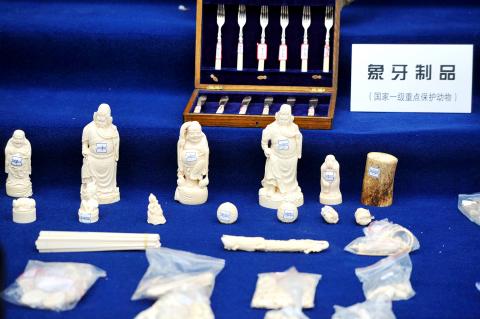Chinese diplomatic and military staff went on buying sprees for illegal ivory while on official visits to Tanzania, sending prices soaring, an environmental activist group said yesterday.
Tens of thousands of elephants are estimated to be slaughtered in Africa each year to feed rising Asian demand for ivory products, mostly from China, the continent’s biggest trading partner.
When Chinese President Xi Jinping (習近平) visited Tanzania last year, members of his government and business delegation bought so much ivory that local prices doubled to US$700 per kilogram, the UK-based Environmental Investigation Agency (EIA) said in a report, citing ivory traders in Dar es Salaam.

Photo: AFP
“When the guests come, the whole delegation, that’s then time when the business goes up,” the EIA quoted a vendor named Suleiman as saying.
They alleged that the buyers took advantage of a lack of security checks for diplomatic visitors to smuggle their purchases back to China on Xi’s plane.
Similar sales were made on a previous trip by former Chinese president Hu Jintao (胡錦濤), the report said, and Chinese embassy staff were also described as “major buyers.”
A Chinese navy visit to Tanzania last year by vessels returning from anti-piracy patrols in the Gulf of Aden “prompted a surge in business for Dar es Salaam-based ivory traders,” it said.
A Chinese national named Yu Bo was arrested during the naval visit as he attempted to enter Dar es Salaam port in a truck containing 81 elephant tusks — hidden under wooden carvings — which he planned to deliver to two mid-ranking Chinese naval officers, the EIA said.
Yu was convicted by a local court in March and sentenced to 20 years in jail, it added.
Tanzania is a key ally of China in East Africa and Tanzanian President Jakaya Kikwete reportedly signed deals worth US$1.7 billion on a visit to Beijing last month.
Tanzania had about 142,000 elephants when Kikwete took office in 2005, the EIA said, adding that by next year, the population is likely to have plummeted to about 55,000 as a result of poaching.
Almost all ivory sales were banned in 1989 by the Convention on International Trade in Endangered Species of Wild Fauna and Flora (CITES), to which both China and Tanzania are signatories.
China often says that it pays “great attention” to the protection of endangered wildlife, and in recent years has carried out several high-profile arrests of smugglers caught in its territory, along with a televised incineration of seized ivory.
The environmental group WWF estimated that about 25,000 African elephants were hunted for ivory in 2011, predicting that the toll would rise.
There could be as few as 470,000 left, it said.

The Ministry of the Interior (MOI) is to tighten rules for candidates running for public office, requiring them to declare that they do not hold a Chinese household registration or passport, and that they possess no other foreign citizenship. The requirement was set out in a draft amendment to the Enforcement Rules of the Public Officials Election and Recall Act (公職人員選舉罷免法 ) released by the ministry on Thursday. Under the proposal, candidates would need to make the declaration when submitting their registration forms, which would be published in the official election bulletin. The move follows the removal of several elected officials who were

The Republic of China (ROC) is celebrating its 114th Double Ten National Day today, featuring military parades and a variety of performances and speeches in front of the Presidential Office in Taipei. The Taiwan Taiko Association opened the celebrations with a 100-drummer performance, including young percussionists. As per tradition, an air force Mirage 2000 fighter jet flew over the Presidential Office as a part of the performance. The Honor Guards of the ROC and its marching band also heralded in a military parade. Students from Taichung's Shin Min High School then followed with a colorful performance using floral imagery to represent Taiwan's alternate name

FOUR DESIGNATED AREAS: Notices were issued for live-fire exercises in waters south and northwest of Penghu, northeast of Keelung and west of Kaohsiung, they said The military is planning three major annual exercises across the army, navy and air force this month, with the navy’s “Hai Chiang” (海強, “Sea Strong”) drills running from today through Thursday, the Ministry of National Defense said yesterday. The Hai Chiang exercise, which is to take place in waters surrounding Taiwan, would feature P-3C Orion maritime patrol aircraft and S-70C anti-submarine helicopters, the ministry said, adding that the drills aim to bolster the nation’s offshore defensive capabilities. China has intensified military and psychological pressure against Taiwan, repeatedly sending warplanes and vessels into areas near the nation’s air defense identification zone and across

COVETED PRIZE: The US president would be a peace prize laureate should he persuade Xi Jinping to abandon military aggression against Taiwan, William Lai said US President Donald Trump should get the Nobel Peace Prize should he be able to convince Chinese President Xi Jinping (習近平) to abandon the use of force against Taiwan, President William Lai (賴清德) told a conservative US radio show and podcast in an interview. The US is Taiwan’s most important international backer, despite the absence of formal ties, but since Trump took office earlier this year he has not announced any new arms sales to the nation. Trump could meet Xi at the APEC summit in South Korea on Oct. 31 and Nov. 1. Lai, speaking on The Clay Travis and Buck Sexton